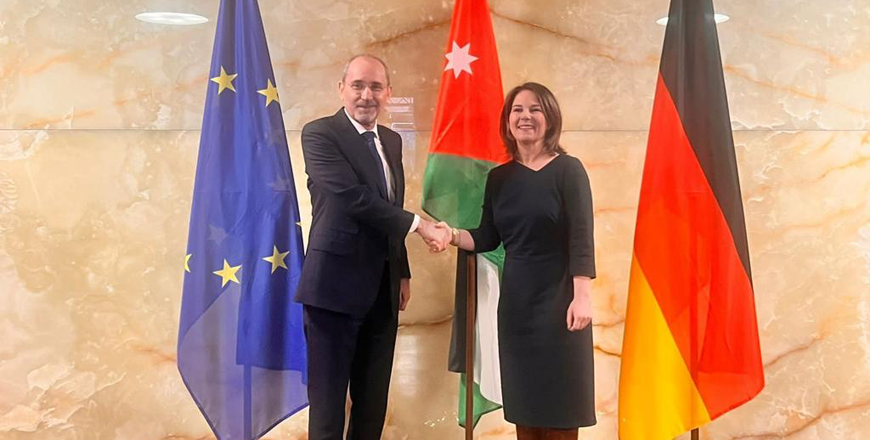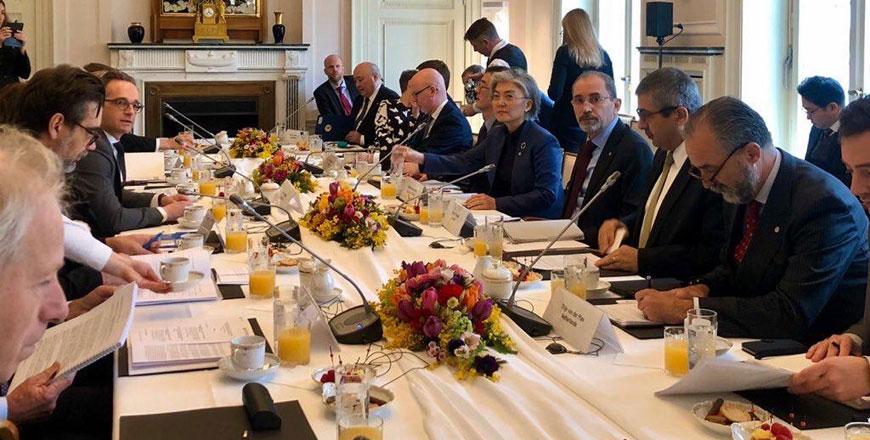You are here
Jordan, Germany stress on 2-state solution, refugee plight as attention shifts to Russia-Ukraine crisis
By Raed Omari - Feb 11,2022 - Last updated at Feb 11,2022

Foreign Minister Ayman Safadi and his German counterpart Annalena Baerbock hold a joint press conference in Amman on Friday (Photo by Raed Omari)
AMMAN – Jordan and Germany on Friday underscored the two-state solution as the "sole" formula to resolve the long-running Palestinian-Israeli conflict.
During a joint press conference by Foreign Minister Ayman Safadi and his German counterpart Annalena Baerbock in Amman, the two top diplomats stressed the need for intensified international efforts to bring the Palestinians and the Israelis back to the negotiating table, highlighting that the two countries are working towards that objective.
"We strongly believe that the two-state solution is the only formula to resolve the conflict and that any step ahead, even if small, would pave the way towards direct negotiations," Baerbock said.
Baerbock re-emphasised Berlin's constant coordination with Amman on pushing for peace negotiations between the Palestinians and the Israelis.
Safadi said that the two countries are working together to create a climate for Mideast peace and to achieve a “breakthrough” in the direct negotiations between the two sides that can lead to the establishment of an independent Palestinian state on the pre-1967 borders with East Jerusalem as its capital.
Ties
The two ministers underlined that Jordan and Germany enjoy strong relations in all fields and “see eye to eye” on a number of regional and international issues, including Syria, Yemen and Iran.
Safadi voiced appreciation for Germany as the second largest donor to Jordan, noting that Berlin's assistance to UNRWA is "immensely" helping Jordan cope with the large numbers of refugees in the Kingdom.
Baerbock, who earlier on Friday visited the Talbieh camp for Palestinian refugees, voiced Berlin's appreciation of the Jordanian humanitarian assistance to refugees from Syria, Palestine and other war-hit countries.
"Jordan is a key partner of Germany and we are its second largest donor. We are committed to supporting Jordan and you can rely on us always," she said.
On Syria, Safadi reiterated Jordan's position on the importance of finding a political solution to ongoing conflict that can safeguard Syria's territorial integrity and put an end to the large-scale suffering of its people.
Baerbock said that Germany understands how challenging is the war in Syria to Jordan, citing the proximity and the hosting of large numbers of refuges. "We understand your concerns and we will continue working with Jordan to overcome these challenges," the German foreign minister said.
Green technology
The Green Party member said that “climate change and green technologies lie at the heart of Berlin's foreign policy”, adding that Germany will continue working with Jordan on addressing its natural resources challenges, primarily water.
"Climate change will be an integral component of German geopolitics on the Middle East."
Baerbock also praised the “energy-for-water” agreement Jordan signed with the UAE and Israel, voicing Germany's support for similar projects across the region.
The minister also said that Germany is discussing with Jordan about the feasibility of hydrogen production in the Kingdom.
Safadi said that Jordan is discussing with Germany the possibility of producing COVID-19 vaccine in the Kingdom.
Ukraine
Baerbock described the tensions between NATO and Russia as still "very critical" despite the ongoing diplomatic efforts.
Referring to the talks on Thursday in Berlin between representatives of Russia, Ukraine, France and Germany, Baerbock said: "The negotiations lasted for 10 hours and we at least agreed on the need to honour Minsk accords."
"Yes, there is a diplomatic effort underway on Ukraine but the situation is still tense militarily with Russia's continued troop build-up along Ukraine's borders and drills in Belarus."
Emphasising that Ukraine's sovereignty is a "red line', Baerbock said that Germany is working with all partners on brining all parties involved in the crisis to the negotiating table.
When asked about Jordan's concerns about the possibility of a war in Europe, Safadi said that "any war in nearby Europe will have its consequences on the region," voicing Jordan's support for diplomatic efforts to resolve the crisis.
"We are concerned about the international community shifting its focus on refugees in the Middle East to other issues. We are deeply concerned about a reduction of international support to hosting countries," Safadi said.
Related Articles
AMMAN — Deputy Prime Minister and Foreign Minister Ayman Safadi and German Foreign Minister Annalena Baerbock on Monday announced that Berli
AMMAN — Foreign Minister Ayman Safadi and his German counterpart Heiko Maas held expanded discussions in Berlin on Tuesday, reviewing aspect
BERLIN — German Chancellor Olaf Scholz said on Wednesday it was too early and "inappropriate" to discuss whether Berlin would in future send


















